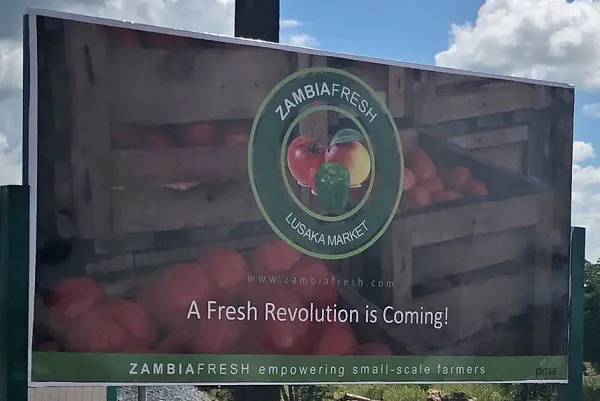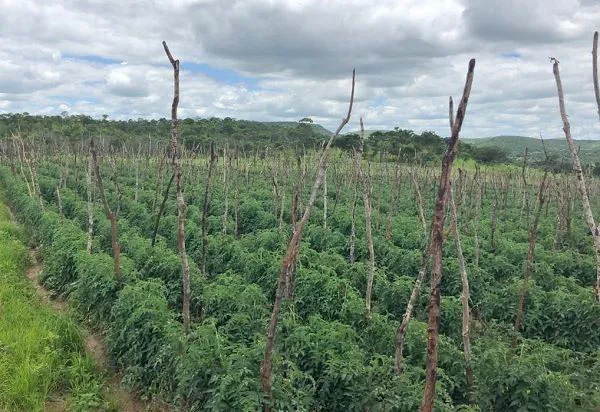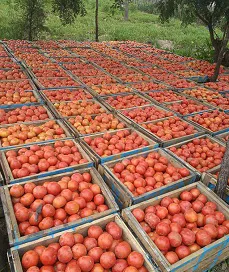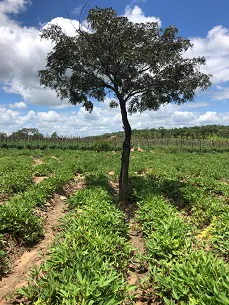The consumption of fresh food and vegetables in Zambia is growing by 10 to 15% annually, a 2018 report has found, while production has been doubling over the past five years.
However, when it comes to the marketing of their produce, Zambian farmers, most of whom are small-scale farmers, are being exploited and not getting their labour’s worth, stifling the growth of the country’s horticultural sector, says Sean Moolenschot, CEO of the ZAMBIAFresh Lusaka Market project being developed by Savenda Capital.
 ZAMBIAFresh billboard at the site of the main market in Lusaka (photos supplied by Sean Moolenschot)
ZAMBIAFresh billboard at the site of the main market in Lusaka (photos supplied by Sean Moolenschot)
The promoters of the project, Sean Moolenschot and Clever Mpoha (seasoned Zambian entrepreneur and MD of the Savenda Group of companies involved in supply chain management, logistics, manufacturing and financial services), have been raising capital to develop a fresh produce market and food hub in Lusaka, but Covid-19 has for the moment opened up other opportunities.
ZAMBIAFresh Palabana Farm
Clever Mpoha saw the opportunity to convert an existing farming property, ZAMBIAFresh Palabana Farm, into a fresh market pilot site. Located on the eastern outskirts of Lusaka, Palabana Farm was originally developed as a model farm to provide training and extension services to small-scale farmers. Vegetables are grown according to small-scale practices, but employing best practices that their supplying farmers can emulate with the help of organisations like Musika.
 Tomato cultivation demonstrating best practices in small-scale farming at Palabana Farm
Tomato cultivation demonstrating best practices in small-scale farming at Palabana Farm
"We have since pivoted Palabana Farm into a market pilot site, where last week our online fresh produce trading system went live," says Sean. It has been designed and implemented by their strategic partner Freshmark Systems, whose trading software is in use at most of South Africa’s fresh produce markets.
“It’s a big milestone for us to start showing that we can trade, that we have suppliers, and our market trading system enables real price discovery,” Sean says. “We remain committed to the development of our main market facility and food hub, and believe that the pilot site at Palabana Farm will provide a tangible demonstration of a working market, albeit on a smaller scale. This will assist in the conclusion of our capital raising for the principal project. The first phase of the main market development site will comprise 6.500m2 to handle 70,000 to 80,000 tonnes within two years, with cold rooms and food safety laboratory.”
Benefits of real price discovery  Continuity and quality of supply are the two main aspects through which ZAMBIAFresh aims to differentiate themselves from the currently unregulated fresh produce system, providing a quality guarantee to retailers, wholesale traders and end consumers.
Continuity and quality of supply are the two main aspects through which ZAMBIAFresh aims to differentiate themselves from the currently unregulated fresh produce system, providing a quality guarantee to retailers, wholesale traders and end consumers.
But mainly, says Sean, their “true north” is the small-scale farmers of Zambia: “A formal market with real price discovery will add more money to farmers’ pockets.”
At the moment, he says, farmers are required to pay highly variable fees every step of the way for the privilege to have their produce sold at informal open-air markets. The only people making money are middlemen, and many of the farmers with whom they have been engaged would love an alternative marketing option.
ZAMBIAFresh operates an agent-commission model similar to that practised at the South Africa national fresh produce markets, but with certain divergences from that system to create a model that is small-scale farmer-centric.
“In Zambia our concept is 100% geared towards supply from small-scale farmers. The challenge was: can we design a market and wrap it around the relatively fragmented horticultural sector in Zambia through creating a formal route to market, with all the trappings of a formal market like standards for quality, packaging, handling and food safety?”
Currently the various fresh produce markets have large seasonal spikes in availability as well as a limited fresh basket, consisting of 50% tomatoes and rounded out by other popular vegetables like impwa (white small aubergines), rape leafy greens, okra and so forth.
ZAMBIAFresh has identified a women’s farmer’s cooperative group that will form their founding supply base, all experienced small-scale farmers, but with little negotiating power due to the current system. They have been, Sean says, impatient for the ZAMBIAFresh market to be up and running.
Freshmark quality standards at ZAMBIAFresh Quality control will be based on the standards employed by South African retailer group Shoprite in Zambia. ZAMBIAFresh have worked with Shoprite procurement arm Freshmark to accredit Palabana Farm as a Shoprite supplier.
Quality control will be based on the standards employed by South African retailer group Shoprite in Zambia. ZAMBIAFresh have worked with Shoprite procurement arm Freshmark to accredit Palabana Farm as a Shoprite supplier.
ZAMBIAFresh is now developing on-farm training programmes to incorporate practices and interventions to help small-scale farmers consistently deliver fresh produce that meets the Shoprite-level standards, considered by ZAMBIAFresh to be the best in Zambia.
“The retailers sometimes get a bad rap but I have to say that Shoprite/Freshmark Zambia have been an amazing value-adding partner in their support for the development of a national fresh produce market in Zambia. We’re creating interventions so that every farmer who’s going to supply the ZAMBIAFresh market has to go through these quality standards training programmes, at no cost.”
Quality of produce in Zambia is already very good, he adds, it’s just not consistent with regards to aspects like ripeness, size, skin integrity and whether a product has been washed and dried. All produce sold at the ZambiaFresh Lusaka Market will give buyers the quality guarantee of conforming to Shoprite-level quality standards (Sean notes that ZAMBIAFresh maintains a commercial arms-length relationship with Shoprite, with no preferential off-take agreements with the retailer).
Opportunity to aggregate imports into ZambiaThe market is primarily geared towards satisfying Zambian consumer demand through local supply with the aim to provide 20 to 25% of Lusaka’s annual 300,000 tonne fresh demand within three years.
Its ancillary role of an import and export hub has been brought to the fore quicker than expected by recent Covid-19 events Sean (right) says.
Due to the lockdown regulations imposed by South Africa, whence come substantial volumes of Zambia’s apples and other early/late season produce, a shortage in produce that can’t be grown in Zambia is developing.
“We can aggregate imports like apples into consolidated orders through negotiation with South African suppliers directly. We’ve got a freight-forwarding business in our group and we’re speaking to the Zambian Revenue Authority to enable critical imports into Zambia more efficiently."
Sean notes that due to seasonal inconsistencies of supply, shortages in Zambia are supplemented by supply procured at the Johannesburg fresh produce market. “We want to provide a conduit for South African producers to come directly to our market through more efficient channels by providing consolidated ordering and transport solutions.”
In fact, he says, Zambia is a great place to do business. “From an agricultural and a geopolitical point of view Zambia is El Dorado. It’s a stable country and it’s surrounded by eight countries with 200 million inhabitants, which is still an untapped opportunity. We’ll hopefully be able to unlock that potential to develop Zambia into a fresh produce trading hub to create a prosperous fresh produce sector that benefits Zambian farmers, first and foremost.”
For more information:
Sean Moolenschot
ZAMBIAFresh
Tel: +27 82 459 1353
+260 96 261 4213
Email: sm@savendacapital.com
